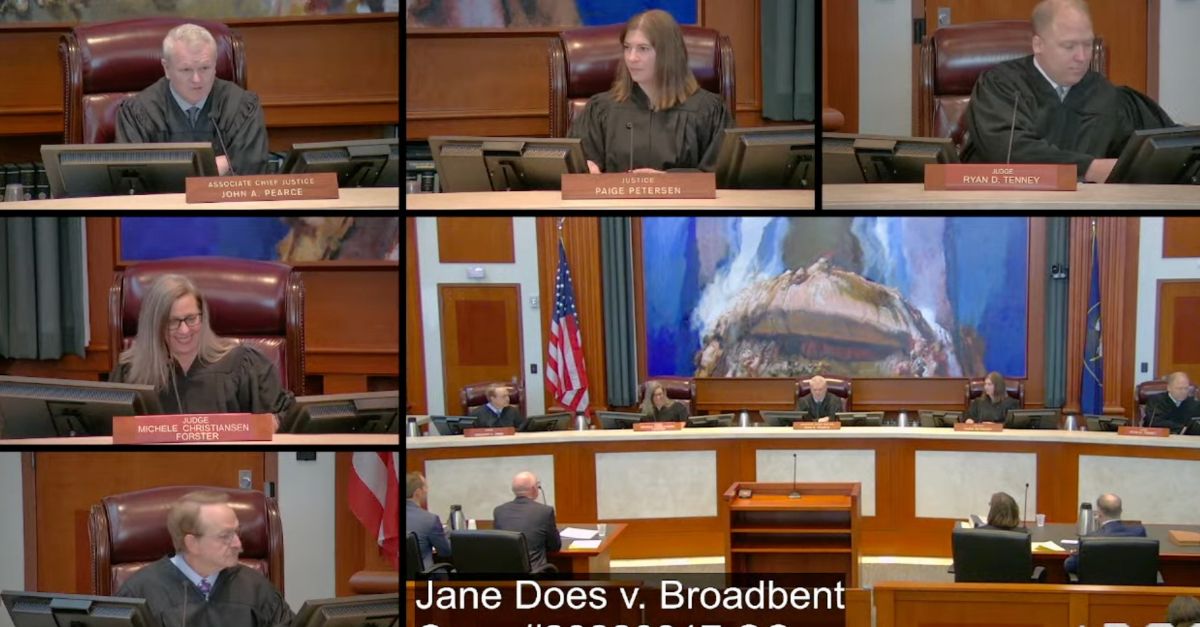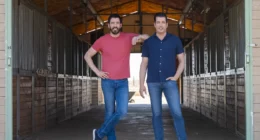
Clockwise from top left: Utah Court of Appeals Judge John A. Pearce; Utah Supreme Court Justice Paige Petersen; Utah Supreme Court Associate Chief Justice John Pearce; judges hear oral arguments in the case of Jane Doe v. Broadbent; Utah Court of Appeals Judge Gregory Orme; Utah Court of Appeals Judge Gregory Orme (Utah Supreme Court).
The Supreme Court of Utah has ruled that sexual assault is not “health care” and revived a lawsuit filed by 94 women who allege their OB-GYN sexually abused them during medical exams or while delivering their babies.
The group of patients sued Dr. David Broadbent and two hospitals in 2022 for civil sexual assault. However, trial judge Robert Lunnen dismissed the case on the grounds that it should have been filed as medical malpractice case, because the women had been receiving health care when the alleged assaults occurred. Under state law, medical malpractice cases are required to take certain steps prior to litigation, such as notifying the doctor and attending a pre-litigation panel to attempt to resolve the claim.
Utah’s state legislature responded to Lunnen’s ruling by amending the state’s medical malpractice statute to specifically exclude sexual assault — though the change would not apply to the Broadbent lawsuit, because the statute did not apply retroactively.
The plaintiffs appealed Lunnen’s ruling and Utah’s highest court reversed and resuscitated the lawsuit against Broadbent.
Only two of the court’s five justices participated in the ruling on Thursday: Justice Paige Petersen and Associate Chief Justice John Pearce. The other three — Chief Justice Matthew Durrant, and Justices Diana Hagen, and Jill Pohlman — were recused and appeals court judges Michele Christiansen Forster, Gregory Orme, and Ryan Tenney participated in their places. All five current Utah Supreme Court justices as well all seven current Utah Court of Appeals judges were appointed by Republican governors.
Broadbent worked as an OB-GYN in Provo, Utah, for over 40 years. Ninety-four of his former patients banded together to file the lawsuit against him, in which they detailed their allegations of sexual assault. One woman said Broadbent insisted, over her objection, that she have a Pap test after she suffered a miscarriage, proceeded to insert a speculum into her vagina and a finger into her rectum, then squeezed her breasts all while she was visibly crying.
Another patient said she saw Broadbent to get checked for a sexually transmitted illness and Broadbent insisted on holding a swab in her vagina “until he counted to one hundred.” Several other young patients reported that Broadbent suddenly put his fingers into their vaginas without warning, and that he made comments such as, “your fiance is pretty lucky to get to have sex with a girl like you.”
Many other patients reported that Broadbent regularly felt their breasts under the guise of breast exams, including during childbirth. One patient alleged that Broadbent had an erection while he was touching her. The plaintiffs reported feeling violated and abused by the doctor’s actions.
Writing for the court, Petersen said the alleged assaults “were not part of their medical treatment, had no medical purpose, and were solely for Broadbent’s own sexual gratification.”
“[N]ot every act a ‘health care provider’ performs is ‘health care’ within the Malpractice Act’s meaning,” explained Petersen. Rather, the judge said, for an act to be deemed “health care,” it must occur “during” the patient’s treatment.
The judge likened the alleged sexual assaults to a doctor’s stealing a patient’s wallet during an examination: medical treatment may relate to the timing of the event, but because there “is no conceivable medical or health purpose” to the action, it is not in itself “health care.”
The Supreme Court’s ruling is a preliminary one in which the court took the allegations as if true for the purpose of settling the legal question of which law applies. Petersen noted that the plaintiffs still bear the burden of proving the claims they have asserted, and commented that the claims might be easier to prove if Broadbent were a podiatrist who interrupted a foot treatment to commit sexual assault.
“But sexual assault does not fall within the scope of medical treatment regardless of whether it is perpetrated by a podiatrist or an OB-GYN,” the court ruled.
Broadbent was criminally charged with forcible sexual assault in June and the case is still pending. He faces up to 15 years in prison in the case and has denied all allegations.
Adam Sorenson, an attorney for the plaintiffs, noted in a statement emailed to Law&Crime that it has been “almost two years” since the “sad and disappointing day” when trial court told the women that “the sexual abuse they suffered was health care.”
“But, the Utah Supreme Court’s decision today affirms everything these women have said from the beginning, and tells every person in Utah that sexual abuse by a health care provider never has been, and never will be, ‘health care,”” Sorenson continued. “It is difficult to describe how good it is to hear that from our highest court, but any joy I feel is nothing compared to the affirmation felt by the women who suffered sexual abuse, were told it was just health care, have fought for three years, and can now say that the law in Utah is on their side on this important issue.”
Sorenson noted that although the lawsuit is filed against Broadbent, “Intermountain Healthcare and Mountainstar are also defendants in this lawsuit as they knew about the abuse and, instead of stopping Broadbent, enabled his abuse of their patients.”
Have a tip we should know? [email protected]









